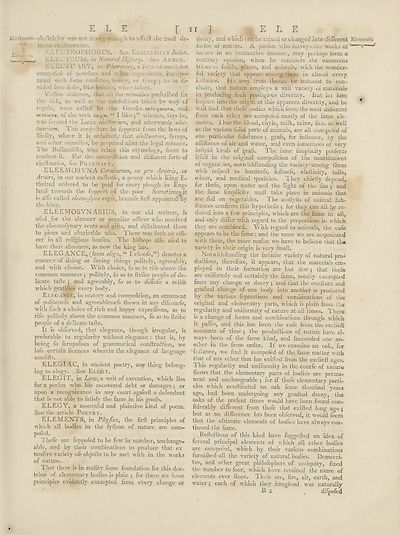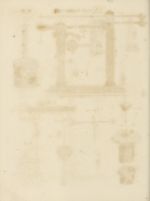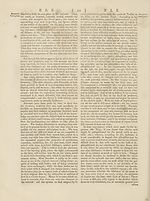Encyclopaedia Britannica, or, a Dictionary of arts, sciences, and miscellaneous literature : enlarged and improved. Illustrated with nearly six hundred engravings > Volume 8, ELE-FOR
(23) Page 11
Download files
Complete book:
Individual page:
Thumbnail gallery: Grid view | List view

E L E [
ilroroc- electricity was not Urong enough to afFecl the moft de-
t''r licate electrometer.
q|its ELECTROPHOgUS. S?e Electricity
- - ELECTRUM, in Natural Hiftory. bee Amber.
ELECTUARY, in Pharmacia a form of medicine
compofed of powders and other ingredients, incorpo¬
rated with fume conferee, honey, or fyrup \ to be di¬
vided into dofes, like bolides, when taken.
Voilius obferves, that all the remedies preferibed for
the nek, as well as the confections taken by way of
regale, were called by the Greeks, ix.x^yu.x.ru, and
iKteucrx, or the verb a£(^s», ” I like j” whence, lays he,
was formed the Latin eleStarium, and afterwards elec-
luanum. This conjecture he funports from the laws of
Sicily, where it is ordained/ that electuaries, fyrups,
and other remedies, be prepared after the legal manner.
T he Bollandifts, who relate this etymology, feem to
confirm it. For the compofition and different forts of
electuaries, fi e Pharmacy.
ELEEMOSYNA Carucarum, or pro Aratris, or
Aratn, in our ancient cuftoms, a penny which King E-
thelred ordered to be paid for every plough in Eng¬
land towards the fupport of the poor Sometimes it
is alfo called eleemofuna regis, beeaufe firft appointed by
the kine.
ELEEMOSYNARIUS, in our old writers, is
ufied,for the almoner or peculiar officer who received
the eleemofynary rents and gifts, and diftributed them
to pious and charitable ufes. There was fuch an offi¬
cer in gill religious houfes. The biffiops alfo ufed to
have their almoners, as now the king has.
ELEGANCE, (from e/igo, “ I choofe,”) denotes a
manner of doing or faying things politely, agreeably,
and with choice. With choice, fo as to rife above the
common manners ; politely, fo as to ftrike people of de¬
licate tafte j and agreeably, fo as to diffuie a reliih
which gratifies every body.
Elkganck, in oratory and compofition, an ornament
of politenefs and agreeablenefs fhown in any difeourfe,
with fuch a choice of rich and happy expreffions, as to
rife politely above the common manners, fo as to ftrike
people of a delicate tafte.
It is obferved, that elegance, though irregular, is
preferable to regularity without elegance : that is, by
being fo fcrupulous of grammatical conftrubtion, we
lofe certain licences wherein the elegance of language
- confifts.
ELEGI \C, in ancient poetry, aruy thing belong¬
ing to elegy. See Elegy.
ELEGIT, in Law, a writ of execution, which lies
for a perfon who has recovered debt or damages ; or
upon a recognizance in any court againft a defendant
that is not able to fatisfy the fame in his goods.
ELEGY, a mournful and plaintive kind of- poem.
See the article Poetry.
ELEMENT'S, in PJiyJtcs, the firft principles of
which all bodies in the fyftem of nature are com¬
pofed.
Thefe are fuppofed to be few in number, unchange¬
able, and by their combinations to produce that ex
tenfive variety oft objects to be met with in the works
of nature.
That there is in reality fome foundation for this doc¬
trine of elementary bodies is plain ; for there are fome
principles evidently exempted from every change or
•i ] E L E
decay, and which can be mixed or changed into different Elements,
ioims or matter. A perfon who furveys the works ol'—
nature in an inattentive manner, may perhaps form a
contrary opinion, when he coniiders ike numerous
triues ox foffils, plants, and animals, with the wonder¬
ful variety that appears among them in almoit every
i utanee. He may from thence be induced to con¬
clude, that nature employs a vail variety of materials
in producing fuch prodigious diveriily. But lei him
inquire into the origin of this apparent divinity, and he *
will find that thefe bodies which feem the molt dilierent
Tom each other are compofed nearly of ibe fame ele .
ments. T hus the blood, chyle, milk, urine, &c. as well
as the various folid parts of animals, are all eoixipoied of
one particular fubitance 5 graft, for inftance, by the
affiftance of air and water, and even iometimes of very
infipid kinds of graft. The fame fimplicity prefents
itfelf in the original compofition of the nouriihment
of vegetables, notwithstanding the variety' among them
with reipect to hardnefs, foftnefs, elaificity, tafte,
odour, and medical qualities. They chiefty depend,
for tbefe, upon water and the light of the fun 5 and
the fame fimplicity muft take place in animals that
are fed on vegetables. The analyfis of animal fub-
itances confirms this hypothefis ; for they can all be re¬
duced into a few principles, which are the fame in all,
and only differ with regard to the proportions in which
they are combined. With regard to animals, the cafe
appears to be the fame: and the more we are acquainted
with them, the more reafon we have to believe that th«
variety in their origin is very fmall.
Notwithftanding the infinite variety of natural pro-
duefions, therefore, it appears, that the materials em¬
ployed in their formation are but few; that thefe
are uniformly and certainly the fame, totally exempted
from any change or decay 5 and that the conflant and
gradual change of one body into another is produced
by the various reparations and combinations of the
original and elementary parts, which is plain from the
regularity and uniformity of nature at ail times. There
is a change of forms and combinations through which
it paffes, and this has been the cafe from the eariiefi:
accounts of time *, the productions of nature have al¬
ways been of the fame kind, and fucceeded one an¬
other in the fame order. If we examine an oak, for
i ilance, we find it compofed of the fame matter with
that of any other that has exifted from the earlieft ages.
1 his regularity and uniformity in the courfe of nature
fliows that the elementary parts of bodies are perma¬
nent and unchangeable 5 for if thefe elementary parti¬
cles which eonftituted an oak fome thoufand years
ago, had been undergoing any gradual decay, the
oaks of the prefent times would have been found con-
fiderably different from thofe that exifted long ago ;
but as no difference has been obferved, it would feem
that the ultimate elements of bodies have always con¬
tinued the fame.
Reflections of this kind have fuggefted an idea of
feveral principal elements of which all other bodies
are compofed, which by their various combinations
furniihed all the variety of natural bodies. Democri¬
tus, and other great philofophers of antiquity, fixed
the number to four, which have retained the name of
elements ever fince. I ht fe are, fire, air, earth, and
water; each of which they imagined was naturally
B 2 v difpofed
ilroroc- electricity was not Urong enough to afFecl the moft de-
t''r licate electrometer.
q|its ELECTROPHOgUS. S?e Electricity
- - ELECTRUM, in Natural Hiftory. bee Amber.
ELECTUARY, in Pharmacia a form of medicine
compofed of powders and other ingredients, incorpo¬
rated with fume conferee, honey, or fyrup \ to be di¬
vided into dofes, like bolides, when taken.
Voilius obferves, that all the remedies preferibed for
the nek, as well as the confections taken by way of
regale, were called by the Greeks, ix.x^yu.x.ru, and
iKteucrx, or the verb a£(^s», ” I like j” whence, lays he,
was formed the Latin eleStarium, and afterwards elec-
luanum. This conjecture he funports from the laws of
Sicily, where it is ordained/ that electuaries, fyrups,
and other remedies, be prepared after the legal manner.
T he Bollandifts, who relate this etymology, feem to
confirm it. For the compofition and different forts of
electuaries, fi e Pharmacy.
ELEEMOSYNA Carucarum, or pro Aratris, or
Aratn, in our ancient cuftoms, a penny which King E-
thelred ordered to be paid for every plough in Eng¬
land towards the fupport of the poor Sometimes it
is alfo called eleemofuna regis, beeaufe firft appointed by
the kine.
ELEEMOSYNARIUS, in our old writers, is
ufied,for the almoner or peculiar officer who received
the eleemofynary rents and gifts, and diftributed them
to pious and charitable ufes. There was fuch an offi¬
cer in gill religious houfes. The biffiops alfo ufed to
have their almoners, as now the king has.
ELEGANCE, (from e/igo, “ I choofe,”) denotes a
manner of doing or faying things politely, agreeably,
and with choice. With choice, fo as to rife above the
common manners ; politely, fo as to ftrike people of de¬
licate tafte j and agreeably, fo as to diffuie a reliih
which gratifies every body.
Elkganck, in oratory and compofition, an ornament
of politenefs and agreeablenefs fhown in any difeourfe,
with fuch a choice of rich and happy expreffions, as to
rife politely above the common manners, fo as to ftrike
people of a delicate tafte.
It is obferved, that elegance, though irregular, is
preferable to regularity without elegance : that is, by
being fo fcrupulous of grammatical conftrubtion, we
lofe certain licences wherein the elegance of language
- confifts.
ELEGI \C, in ancient poetry, aruy thing belong¬
ing to elegy. See Elegy.
ELEGIT, in Law, a writ of execution, which lies
for a perfon who has recovered debt or damages ; or
upon a recognizance in any court againft a defendant
that is not able to fatisfy the fame in his goods.
ELEGY, a mournful and plaintive kind of- poem.
See the article Poetry.
ELEMENT'S, in PJiyJtcs, the firft principles of
which all bodies in the fyftem of nature are com¬
pofed.
Thefe are fuppofed to be few in number, unchange¬
able, and by their combinations to produce that ex
tenfive variety oft objects to be met with in the works
of nature.
That there is in reality fome foundation for this doc¬
trine of elementary bodies is plain ; for there are fome
principles evidently exempted from every change or
•i ] E L E
decay, and which can be mixed or changed into different Elements,
ioims or matter. A perfon who furveys the works ol'—
nature in an inattentive manner, may perhaps form a
contrary opinion, when he coniiders ike numerous
triues ox foffils, plants, and animals, with the wonder¬
ful variety that appears among them in almoit every
i utanee. He may from thence be induced to con¬
clude, that nature employs a vail variety of materials
in producing fuch prodigious diveriily. But lei him
inquire into the origin of this apparent divinity, and he *
will find that thefe bodies which feem the molt dilierent
Tom each other are compofed nearly of ibe fame ele .
ments. T hus the blood, chyle, milk, urine, &c. as well
as the various folid parts of animals, are all eoixipoied of
one particular fubitance 5 graft, for inftance, by the
affiftance of air and water, and even iometimes of very
infipid kinds of graft. The fame fimplicity prefents
itfelf in the original compofition of the nouriihment
of vegetables, notwithstanding the variety' among them
with reipect to hardnefs, foftnefs, elaificity, tafte,
odour, and medical qualities. They chiefty depend,
for tbefe, upon water and the light of the fun 5 and
the fame fimplicity muft take place in animals that
are fed on vegetables. The analyfis of animal fub-
itances confirms this hypothefis ; for they can all be re¬
duced into a few principles, which are the fame in all,
and only differ with regard to the proportions in which
they are combined. With regard to animals, the cafe
appears to be the fame: and the more we are acquainted
with them, the more reafon we have to believe that th«
variety in their origin is very fmall.
Notwithftanding the infinite variety of natural pro-
duefions, therefore, it appears, that the materials em¬
ployed in their formation are but few; that thefe
are uniformly and certainly the fame, totally exempted
from any change or decay 5 and that the conflant and
gradual change of one body into another is produced
by the various reparations and combinations of the
original and elementary parts, which is plain from the
regularity and uniformity of nature at ail times. There
is a change of forms and combinations through which
it paffes, and this has been the cafe from the eariiefi:
accounts of time *, the productions of nature have al¬
ways been of the fame kind, and fucceeded one an¬
other in the fame order. If we examine an oak, for
i ilance, we find it compofed of the fame matter with
that of any other that has exifted from the earlieft ages.
1 his regularity and uniformity in the courfe of nature
fliows that the elementary parts of bodies are perma¬
nent and unchangeable 5 for if thefe elementary parti¬
cles which eonftituted an oak fome thoufand years
ago, had been undergoing any gradual decay, the
oaks of the prefent times would have been found con-
fiderably different from thofe that exifted long ago ;
but as no difference has been obferved, it would feem
that the ultimate elements of bodies have always con¬
tinued the fame.
Reflections of this kind have fuggefted an idea of
feveral principal elements of which all other bodies
are compofed, which by their various combinations
furniihed all the variety of natural bodies. Democri¬
tus, and other great philofophers of antiquity, fixed
the number to four, which have retained the name of
elements ever fince. I ht fe are, fire, air, earth, and
water; each of which they imagined was naturally
B 2 v difpofed
Set display mode to:
![]() Universal Viewer |
Universal Viewer | ![]() Mirador |
Large image | Transcription
Mirador |
Large image | Transcription
Images and transcriptions on this page, including medium image downloads, may be used under the Creative Commons Attribution 4.0 International Licence unless otherwise stated. ![]()
| Permanent URL | https://digital.nls.uk/192263718 |
|---|
| Attribution and copyright: |
|
|---|
| Description | Ten editions of 'Encyclopaedia Britannica', issued from 1768-1903, in 231 volumes. Originally issued in 100 weekly parts (3 volumes) between 1768 and 1771 by publishers: Colin Macfarquhar and Andrew Bell (Edinburgh); editor: William Smellie: engraver: Andrew Bell. Expanded editions in the 19th century featured more volumes and contributions from leading experts in their fields. Managed and published in Edinburgh up to the 9th edition (25 volumes, from 1875-1889); the 10th edition (1902-1903) re-issued the 9th edition, with 11 supplementary volumes. |
|---|---|
| Additional NLS resources: |
|

